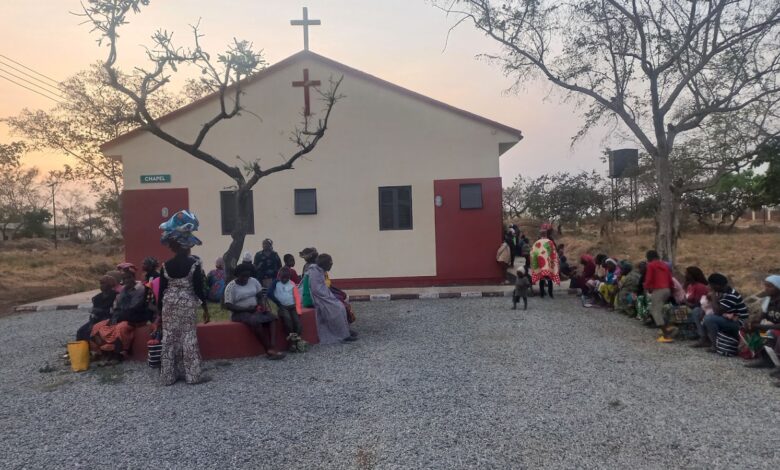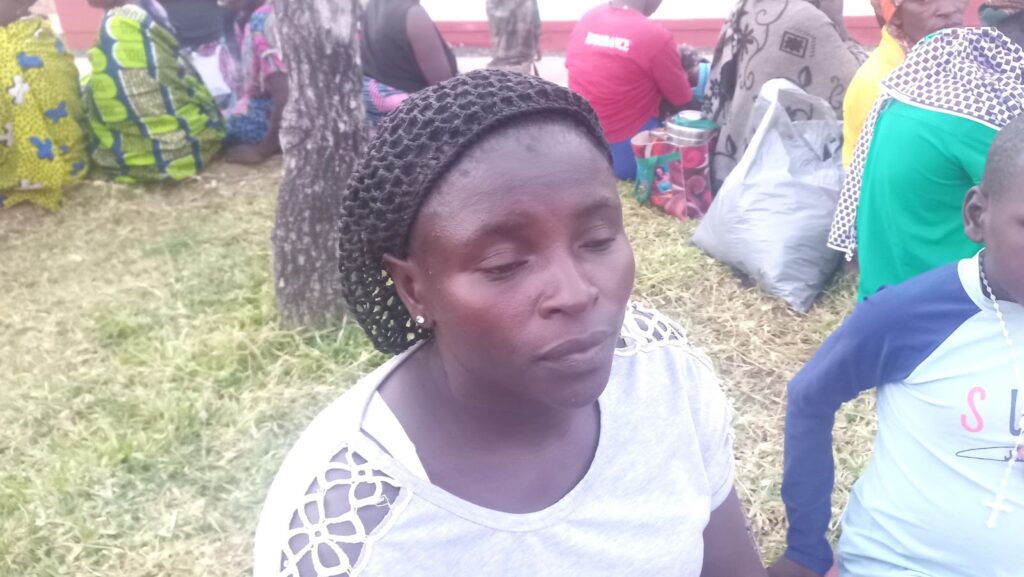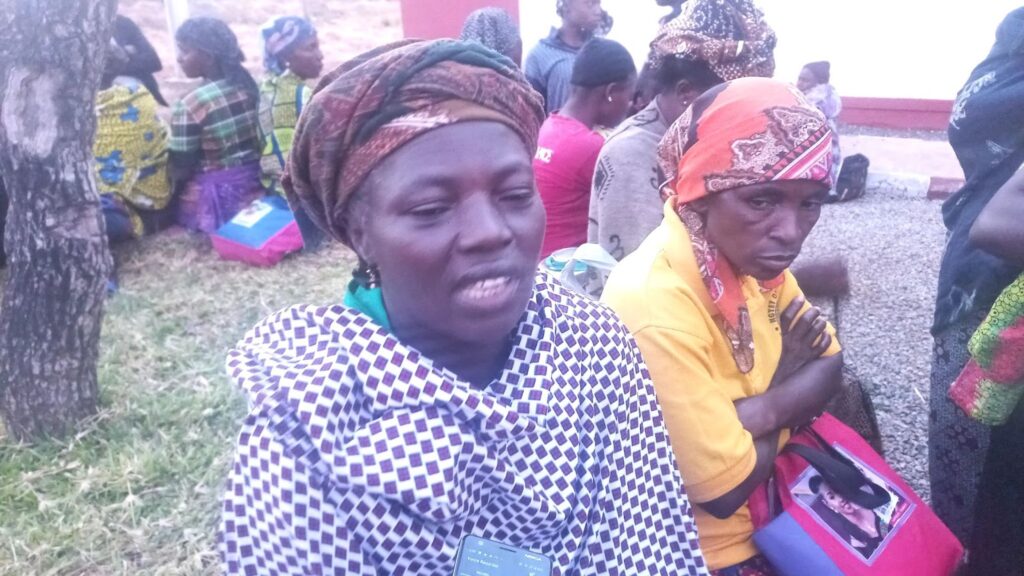In Southern Kaduna, Women And Children Sleep At A Hospital To Escape Terror
Afraid for their lives, every night they seek shelter at Jennifer Etuh Specialist Hospital in Mallagun and return to their communities by dawn. But for how long will this continue?

Just before dusk, lines of women and children approach from different directions. Some from the long driveway that leads to the gates of Jennifer Etuh Specialist Hospital. Others come from the bush path on the west side of the facility. On their heads are mats and mattresses. In their hands, other items like bags and blankets.
Expressions sober, they look like a procession of mourners. But they are not about to bury loved ones, although some have – they already placed not less than 40 beneath the earth.
The attacks that began in December and culminated in the Dec. 18 massacre hit these communities very hard. Mallagun 1 and Sakong are settlements under the Kaura Local Government Area (LGA) of Gworok (Hausa; Kagoro) chiefdom in Southern Kaduna, northwestern Nigeria.
Many houses went up in flames, residents were gunned down or hacked to death.
Since the first signs of terror, the men sent off their women and children to safety. One such safe haven was the Jennifer Etuh Specialist Hospital just by Mallagun’s highway.
Visitors at dusk
The 50-bed specialist hospital opened in July 2022. Built in Mallugun 1 in memory of Jennifer Ramatu Etuh, wife of Thomas Etuh, the founder of a successful business conglomerate involved in agriculture and finance.

Before she died of cancer aged 45, the late Mrs Etuh wanted to provide healthcare services to women and children in rural communities. In usual times the hospital provides cancer screening services and other specialist health care to the nearby communities in Southern Kaduna, where Mrs Etuh was originally from.
Who knew that barely a year after it was opened, the same women and children from the communities would flee to the hospital? Run to it, not for medical care but to avoid gunshots, machetes and their blazing homes.
Dicey situation
Master Warrant Officer Ayuba Shamang, the chief security officer of the facility, knew he had a dicey situation on his hands the first time the displaced flocked to the facility. The hospital was secured by a team of police personnel and local vigilantes, and people felt it would be safe.
Shamang quickly sought permission from the hospital authority to allow the people in. When it was granted, the hospital chapel was opened up.
Some came in the evening around five, six or eight o’clock, and returned early in the morning, Shamang told HumAngle. “They have nowhere to sleep and we can’t send them away. That’s how it has been. I don’t know when this issue will end. Some of them are finding it very difficult. By merely seeing them, you can’t help but sympathise with them.”
Shamang was not the only one moved by their predicament. Dr Oluwajoba Oroge, the medical officer-in-charge, was among the welcoming party. He recalled how people from neighbouring villages showed up at the gate. Some with mats and clothing. Others did not have the time to grab anything. They came without any food.
“They were displaced and didn’t have anywhere to go and needed a place to stay. So we welcomed them – myself, the administrator and the matron and then the chaplain,” Dr Oroge explained.
The authorities settled the displaced in the chapel.


“The chaplain was very helpful with this and the administrator as well. I spoke with them in English and somebody had to interpret in Hausa,” he said.
Then the security personnel were instructed to keep a close watch. A screening process was carried out to ensure the visitors were who they said they were.
“The attackers work with spies as well,” Dr Oroge explained.
Around that time, rumours filtered in that the hospital itself was under threat. So they took extra security measures. This included being strict with the time the displaced persons came in for the night. They were also instructed to restrict their movement to the chapel premises.
On Dec. 18, the day of the most violent attack, at least 60 people were sheltering in the hospital.
How they fled
On the outbreak of the violence, Blessing Felix, 35, dashed to Jennifer Etuh Specialist Hospital with her five children – the youngest three and the oldest 18. The first day they thought they could return home the next morning. But by Dec. 18, their house had been burned down. They continued to return to the hospital for shelter each evening.
During the day, Blessing and her family stay with her mother in Mallagum 1. Luckily, the older woman’s home was not destroyed. Before nightfall, everyone, including her aged mother, gets up and moves to spend the night at the hospital.

During the crisis, a charity organisation visited and gave out mats and blankets. They also provided foodstuffs and cooking oil. The displaced use these during the day to cook back home before darkness falls. Before the attack, Blessing’s business involved selling cooked food to her customers. Her husband farmed their land.
Kande Joseph, 50, recalled her first day at the hospital after escaping from Mallagun 1. “If you have two wrappers, you spread one; if not, you sleep on the bare floor,” she narrated. “The next morning, they returned to their homes for the burial of the people killed between Mallagun 1 and Sakong.”
“The attackers returned on the 15th in the evening. We were still home then and cooking in preparation to return here. I remember how a nursing mother ran for her dear life.”

The Saturday before the major attack, Kande had made up her mind not to return to the hospital. This was because she saw soldiers within the neighbourhood and felt secure.
“I was told to come here, but I refused. But a woman pressured me until I left. She grabbed my bag and literally dragged me,” she said.
Just before midnight, from their safe haven in the hospital, they heard the first gunshot. And then more. Kande could never be grateful enough for the woman who pressured her to leave. She did not think anyone would come out alive that night from her village. “But God helped us, although about 40 people were killed.”
They currently live their lives in a manner they probably never imagined. “If you have a tree outside your burnt house, you go back and stay there. We also cook there. Sometimes we gather together and just banter. Sometimes my husband and children just stay by the river, but when things get worse, they join us here,” she explained.

Mary Victor, 55, was not as fortunate as Kande. Not only did she lose her home, but her 31-year-old son.
“When the attack came, we were still in the house. After we ran, we could hear some of the attackers arguing whether to pick our belongings or simply burn down the house,” she told HumAngle.
Mary is the wife of Mallagun’s village head, who watched his son die that fateful night. Once farmers, today they depend on charity to feed their families.
As the year began, the feeling of imminent threat began to lift. But any time rumours of an impending attack spread, they flooded the hospital once more.
The rumours
One panicked return to the shelter of the hospital was sparked by the beating of a stranger passing through the area.
A man in his 20s was captured by local youths. Apparently, he was coming from a distant village. Suspicious and filled with anger fueled by the killings in the area, they pounced on him.
Luckily, some older people intervened. They realised that this was an innocent individual who was not attacking anybody.
“So they rescued him,” Dr Oroge narrated. “Among them were two older villagers and a reverend father.”
The rescuers took him to the nearest police station and then to the hospital. To ensure the man was all right, his rescuers dropped some payment. These older persons understood the implication of causing harm to an innocent person.
Oroge pointed out: “I received the patient that day and saw that he had minimal injuries. He was in pain, but there was no reason to believe he had internal injuries. We were able to let him go later that night and I told them to make sure he understands that they [the community] actually cared for him.”
After that incident, there was more tension in the surrounding villages because the news of the beating spread. This is reflected in the way the people flocked into the chapel again.
As of Jan. 25, Dr Oroge noted the number of people seeking shelter at dusk had begun to dwindle. “Some people are beginning to settle into their homes, trying to repair what they can. But many have not been able to do that. That’s why some of them still come here,” he said.
There were still five to ten people every night.
Support Our Journalism
There are millions of ordinary people affected by conflict in Africa whose stories are missing in the mainstream media. HumAngle is determined to tell those challenging and under-reported stories, hoping that the people impacted by these conflicts will find the safety and security they deserve.
To ensure that we continue to provide public service coverage, we have a small favour to ask you. We want you to be part of our journalistic endeavour by contributing a token to us.
Your donation will further promote a robust, free, and independent media.
Donate HereStay Closer To The Stories That Matter




